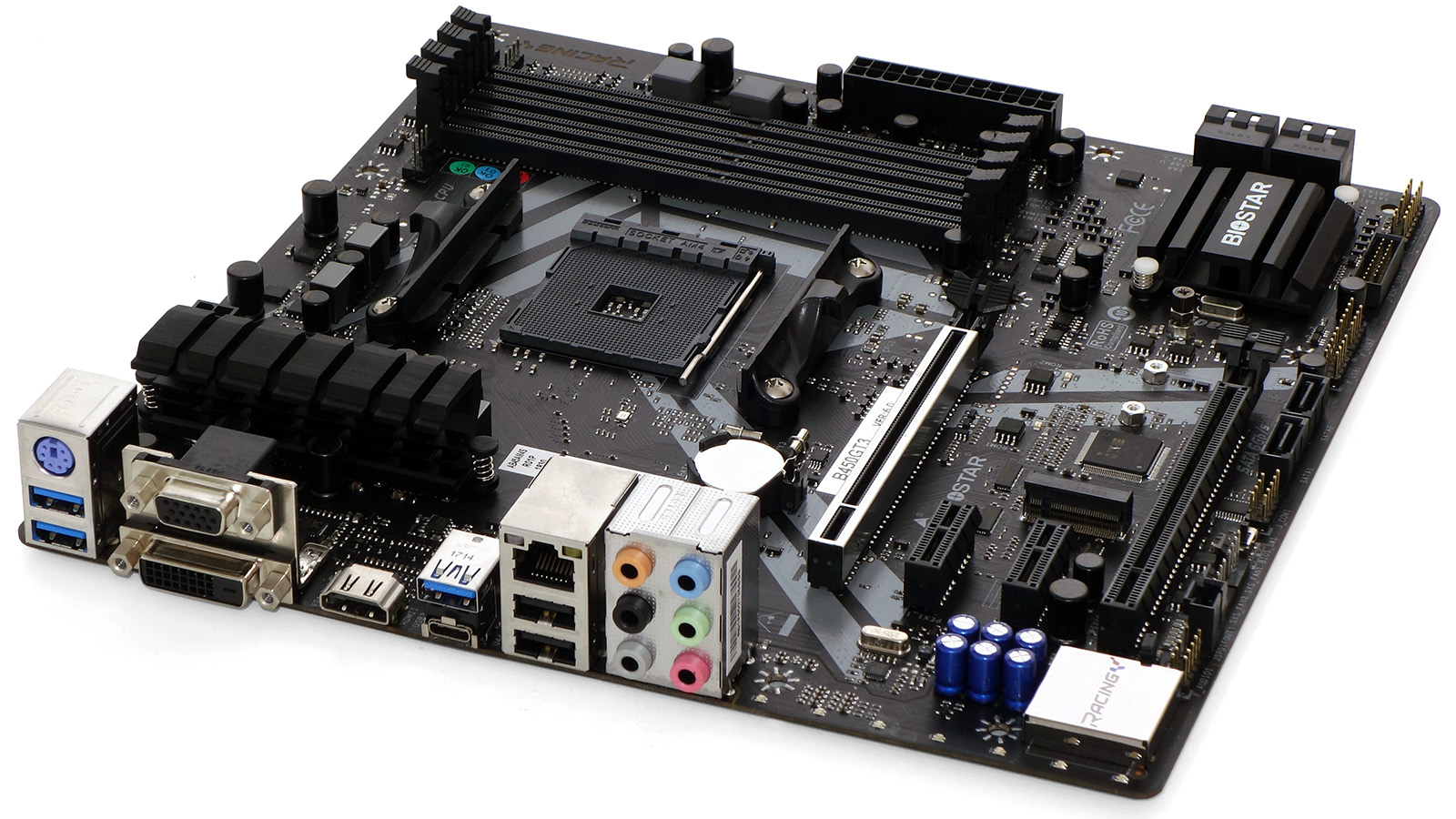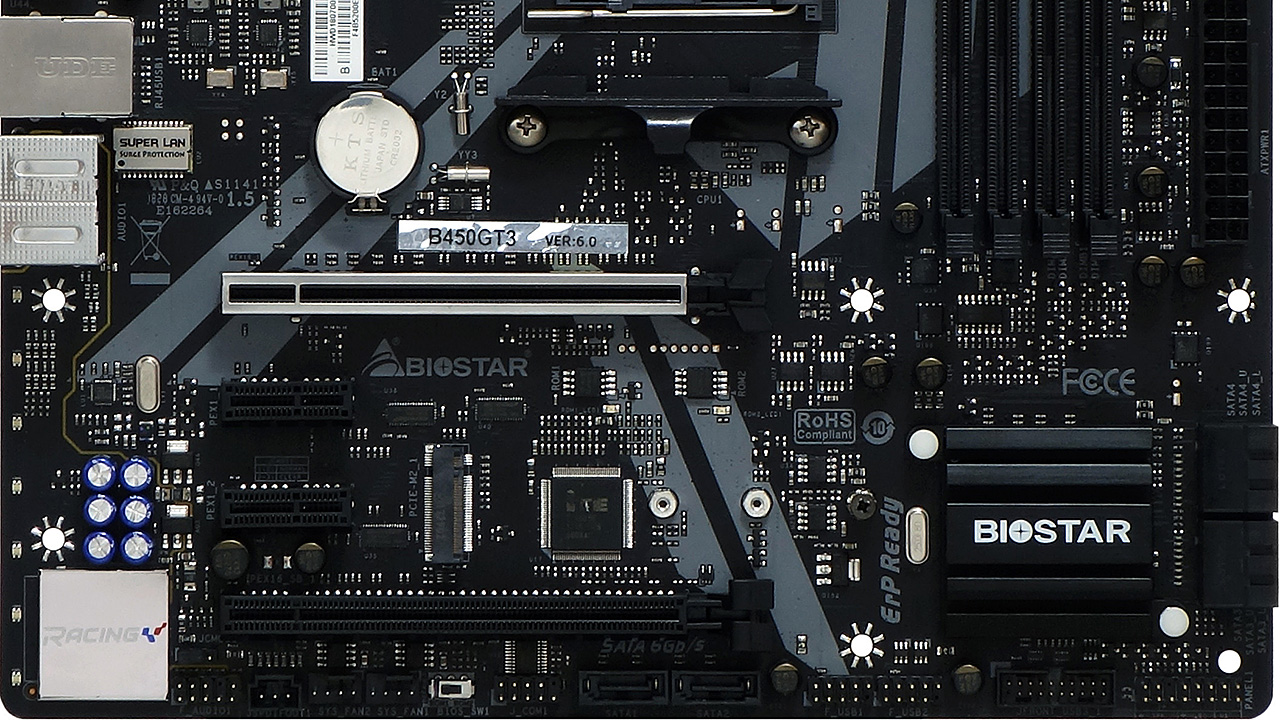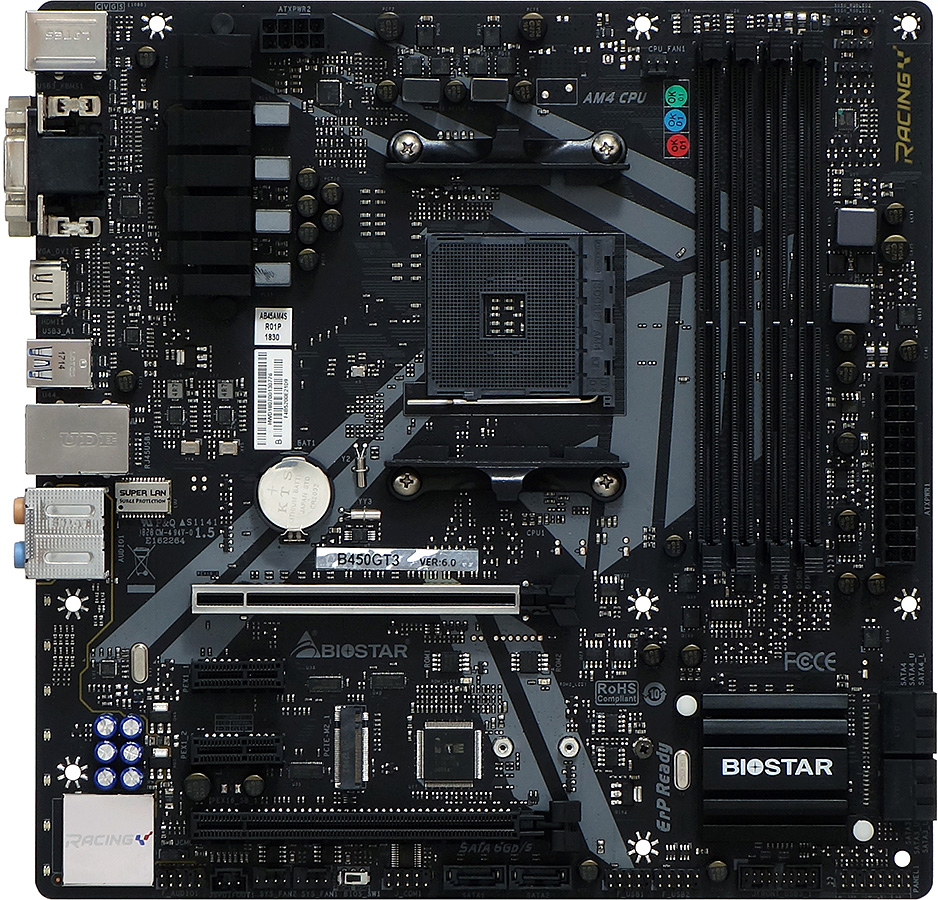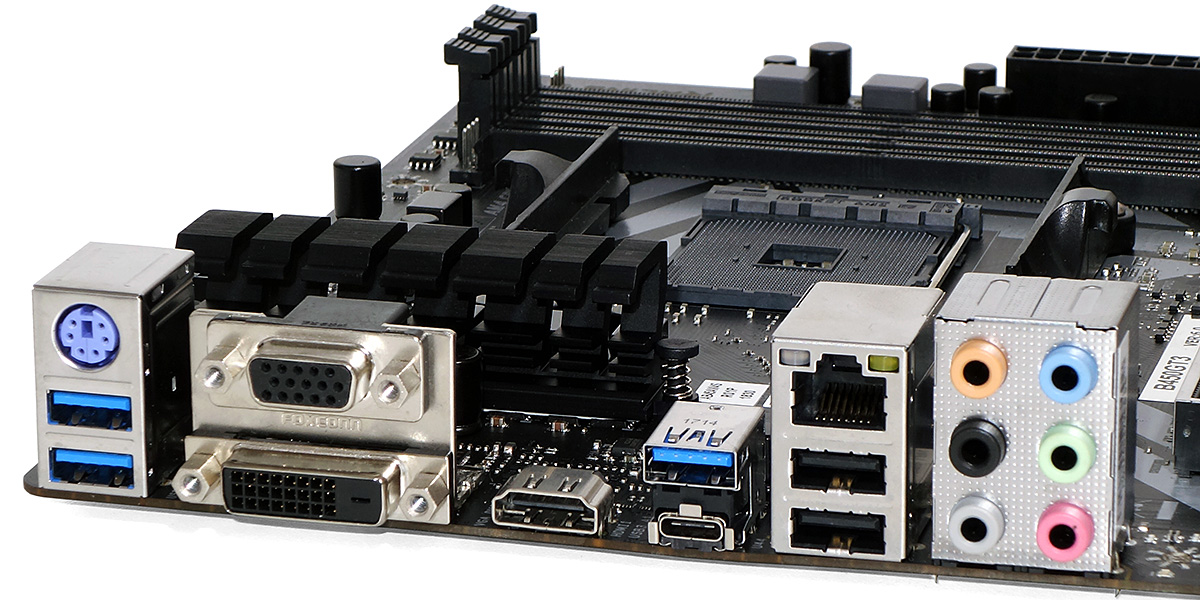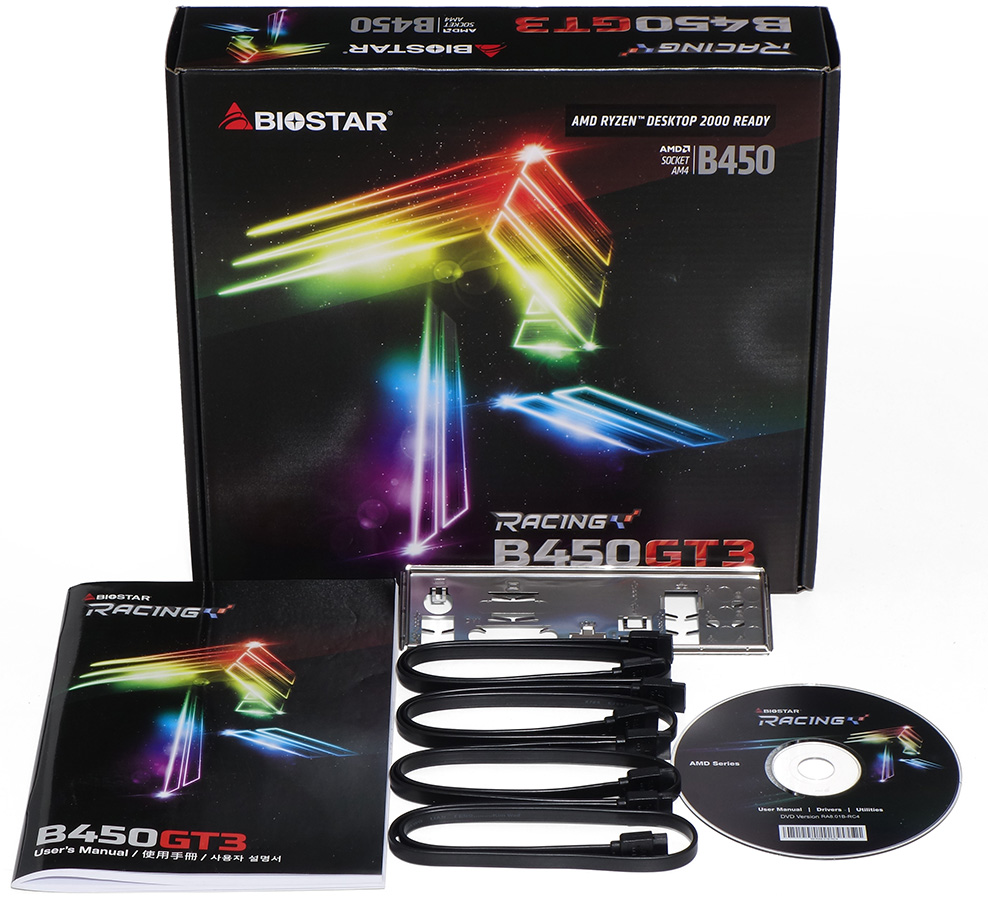Tom's Hardware Verdict
The Biostar Racing B450GT3 offers good overclocking and a feature set targeted at budget-minded performance seekers. It’s a great deal when you can find it at the right price, but if you can’t get it for around $100, you might want to wait, or look elsewhere.
Pros
- +
Solid CPU ovecrlocking
- +
Good DRAM overclocking
- +
Low price at the time of publication
Cons
- -
Few overclocking controls
- -
Spotty availability when we wrote this
- -
Drastic price swings
Why you can trust Tom's Hardware
Features and Layout
Value is often a driving force for AMD buyers, which motivated us to check out the Racing B450GT3 from Biostar. After building a test system around it and putting it through our test suite, we came away mostly impressed. But be warned: Pricing, likely influenced by limited stock, fluctuated wildly at various outlets as we were testing and writing.
If you can find this board for under $100, where it seemed to settle when we were wrapping up this review, it's a good deal. But if it's priced significantly higher when you read this, you should probably look elsewhere, or wait for the price to swing back down.
Specifications
| Socket | AM4 |
| Chipset | AMD B450 |
| Form Factor | Micro ATX |
| Voltage Regulator | 6 Phases |
| Video Ports | VGA, DVI-D, HDMI |
| USB Ports | 10Gbps: (1) Type-C, (1) Type A5Gb/s: (2) Type A, (2) USB 2.0 |
| Network Jacks | (1) Gigabit Ethernet |
| Audio Jacks | (6) Analog |
| Legacy Ports/Jacks | (1) PS/2 |
| Other Ports/Jack | ✗ |
| PCIe x16 | (2) v3.0 (x16, Raven Ridge at x8), (1) v2.0 (x4) |
| PCIe x8 | ✗ |
| PCIe x4 | ✗ |
| PCIe x1 | (2) v2.0 |
| CrossFire/SLI | 2x / x |
| DIMM slots | (4) DDR4 |
| M.2 slots | (1) PCIe 3.0 x4* / SATA(*Excludes SATA pts 1/2) |
| U.2 Ports | ✗ |
| SATA Ports | (6) 6Gb/s |
| USB Headers | (1) v3.0, (2) v2.0 |
| Fan Headers | (3) 4-Pin |
| Legacy Interfaces | Serial Com Port, System (Beep-code) Speaker |
| Other Interfaces | SPDIF-Out, FP-Audio, (2) RGB-LED |
| Diagnostics Panel | ✗ |
| Internal Button/Switch | ✗ / Dual BIOS Selector |
| SATA Controllers | Integrated (0/1/5/10) |
| Ethernet Controllers | WGI219V PHY |
| Wi-Fi / Bluetooth | RTL8118AS PCIe |
| USB Controllers | ✗ |
| HD Audio Codec | ALC1150 |
| DDL/DTS Connect | ✗ / ✗ |
| Warranty | 3 Years |
AMD’s AM4 socket supports a PCIe 3.0 x16 graphics card plus a NVMe SSD without considering chipset features, so the step down from X470 to B450 is a small one. AMD doesn’t let B450 boards split the CPU’s x16 group across two slots as seen on the X470, but this technology (called CPU Bifurcation) is hardly an issue for most people, who will only install one graphics card. The lack of CPU PCIe bifurcation could be more of an annoyance to those who’d like to install a PCIe x8 storage card, but those buyers aren’t a large part of the budget motherboard market, either.
The CPU’s PCIe x4 storage interface, on the other hand, can split, and in the B450GT3’s case this means that half of the lanes to the M.2 slot must be disabled to activate two (of the six) SATA ports. Understanding this, Biostar shoves those two ports under its bottom (four-lane) x16-legth slot, which should help to encourage performance-minded value seekers to put a PCIe NVMe card there. That is, after all, the easiest way to mount to NVMe drives on a board that only has one M.2 interface.
That bottom slot isn’t always x4 either, however, since the two PCIe x1 slots steal lanes from it whenever a card is detected. The three rectangular ICs seen around the top and back of the M.2 connector are responsible for detecting and switching pathways for M.2 to SATA and PCIe x4 to x1 slot enablement.
In addition to the two previously-mentioned SATA ports, the bottom edge includes connectors for front-panel audio, a SPDIF output adapter, two four-pin (three-pin compatible) fans, a switch for dual-firmware IC selection, a legacy COM port, two dual-port USB 2.0 front-panel cables, a USB 3.0 front-panel cable, a PC speaker, and an Intel-style front-panel button/LED connector group. Though most users will not likely need the bottom two SATA ports, those hoping to put a graphics card in the bottom slot may lose access to the front-panel USB 3.0 port if their graphics cooler is longer than 7.5 inches (19.01cm).
Panning out reveals that our greatest concern about this board’s value to budget-minded enthusiasts isn’t its chipset, but its six-phase voltage regulator. The previously tested Racing X470GT8 offered twice the phase count. The B450GT3 has the same number of RGB headers (two) near the upper front corner however. For those paying close attention, the third four-pin connector above the RGB headers is undocumented.
Get Tom's Hardware's best news and in-depth reviews, straight to your inbox.
Both of the chipset’s 10Gb/s USB 3.1 ports are located on the back panel, with no Gen2 front-panel connector available on the board. The I/O panel also has a pair of USB 2.0 ports for your keyboard and mouse, a pair of USB 3.1 Gen1 (aka USB 3.0) ports, a PS/2 port for those who prefer an ancient keyboard or mouse, integrated graphics outputs via 15-pin D-sub, DVI-D and HDMI, onboard 7.1-channel audio via up to four of the six stereo minijacks, and the Gigabit Ethernet port.
The Racing B450GT3’s modest accessory kit includes a user’s manual, I/O shield, four SATA cables, and a driver/application disc.
MORE: Best Motherboards
MORE: How To Choose A Motherboard
MORE: All Motherboard Content
